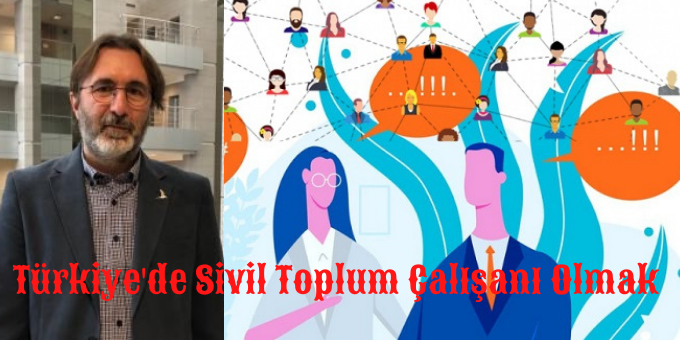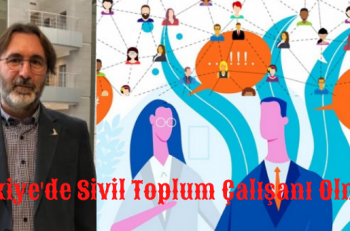“There is Tension Between NGO Employees’ Voluntary Dedication and their Rights”

The tendency among NGO employees to not consider themselves as ‘workers,’ leads to continuous tension between their voluntary dedication and rights, Alper Akyüz of Istanbul Bilgi University says.
As Turkey’s civil society organizations go more institutionalised and increasingly dependent on external funding in a growingly narrowing civic space in the country’s current regime, controversies regarding multifaceted conditions of its human resource arise. In a series of articles, Civil Pages seeks to understand the symptoms, patterns, causes of and possible solutions to these discussions. In this one, we asked about working conditions and legal rights of civil society professionals to Alper Akyuz, an expert of work ethics and organisation and a professor at Istanbul Bilgi University teaching on relevant topics as well as a professional at various civil society organizations. Here are excerpts from our interview.
Civil Pages: What rights do NGO employees have in Turkey? Are there differences between their rights and those of employees in other industries?
Alper Akyuz: There is no legal difference, since every wage earner in Turkey is subject to the Labor Law and has the status of a worker. NGO employees possess the same rights concerning the wage scheme, leaves, work hours, occupational health and safety, and union rights. Freelancers and social entrepreneurs have certain differences, but when they employ someone else, in legal terms, they become employers and their employees become workers.
Furthermore, NGO employees are covered by binding international legal texts such as conventions on economic and social rights, the European Social Charter, and International Labor Organization’s conventions. NGO employees fall in the so-called Education and Office Employees category, and thus can join trade unions organizing that category. Indeed, there are unionized NGOs. Here, the difference stems not from the law, but from employees’ self-perception.
On one hand, when you consider the organizational skills, and the focus on rights prevalent among NGOs, you might think that NGOs would respect their employees’ rights as well. In practice, however, employees have the tendency not to exercise these rights – for example by performing unpaid overtime work, not taking their leaves, and accepting lower wages and limited wage rises, either of their own accord or at the request of their executives. They may legitimize this situation in their own eyes, by thinking that “they work for an NGO,” “the NGO has limited financial resources,” “they are performing a very meaningful work,” “their work hours are unclear due to the nature of the job,” and “they would feel as if they were betraying the organization or its target audience if they demanded their rights,” etc.
On the other hand, since they do not see themselves as workers, some are unaware of their right to join a union or engage in collective bargaining. This points to an internal contradiction within NGOs with regards to employee rights, which must be addressed seriously.
C.P. Are you aware of any rights violations in specific NGOs?
A.A. I was provided a lot of information on rights violations in different NGOs in various one-on-one interviews. It would not be right for me to name these NGOs here, as the controversies are not public yet, but I can say that there is a wide array of rights violations, such as lack of compensation for overtime work – even in the form of paid leaves – unjustified layoffs, and the changing of an NGO’s industry category just to avoid unionization. Finally, in order to prevent any misunderstanding, I should indicate that;
C.P. Would it be a “luxury” to discuss the problems of NGO employees and volunteers at a time when the space of civil society in Turkey is contracting day after day?
A.A. First of all, let us agree that no right is a luxury, and that no right can be isolated from other rights to be trivialized or eliminated. If the civil society is contracting, where must one initiate an effort to stop this? Should we begin by using this contraction as a pretext to contract the civil society within the NGOs? Or, on the contrary, should we instead build highly prestigious and exemplary NGOs resistant to outside pressure and crisis, by upholding all the rights within the organization?
In my PhD work and the various cases I studied later on, I have observed that the work commitment of NGO employees is stronger than their peers in the private sector, and that this sense of commitment and belonging is authentic, not artificially fabricated. For this reason, these employees themselves make solution proposals to their NGOs, when going through a rough patch.
C.P Is there a need for a specific regulation or measure for NGO employees and volunteers?
A.A. With regards to employee rights, since NGOs are not granted any special status in the labour legislation, they should first of all adopt best practices within their organizations, share this effort and its positive results with the society at large, and collaborate with trade unions so as to secure gains for their employees.
About volunteering, there is no specific legislation in this field. There is an ongoing debate on drafting legislation for the recognition of volunteer work and the protection of volunteers’ rights without prejudice to their volunteer status. The important thing here is to draw attention to the limits of regulation through laws. Without doubt, the volunteers’ rights ought to be protected against possible abuse or problems; however, excessive regulation would pave the groundwork for the state’s further interventions and thus offer it new opportunities to narrow down civil society.
C.P. Could the creation and expansion of structures such as the Civic Space Solidarity Network established by Universus strengthen the solidarity among NGO employees and volunteers, and prevent new rights violations?
A.A. Trade unions are the only organizational form which can gain legal authority to defend employee rights at the workplace, and it is crucial not to lose sight of that. Legitimate criticisms towards the unions are important yet secondary. Employees can transform these unions only by participating actively in them and through long-term struggle. On the other hand, an informal solidarity and communication network, which goes beyond trade unions, will certainly constitute a beneficial platform, free from power relations and hierarchies, as long as it can offer support and strength to members and generate collective knowledge.
Some of the problems result from the procedures and terms imposed by organizations that fund NGO projects.
While discussing the issue, one should refrain from thinking that the NGOs, their managers, employees and volunteers operate in a vacuum. Some problems stem from the procedures and terms imposed by organizations that fund NGO projects. For example, in general, the project budgets do not include sums for employees’ severance pays or side benefits; as such, when the project ends and its funds are depleted, the NGO is incapable of providing the employees their well-deserved severance pay.
It is very difficult for non-profit organizations to raise and document such sums in a transparent way, unless they have sufficient independent funding, and this is very difficult in Turkey where the culture of donation is very weak.
In this regard, the Labor Law does not distinguish between for-profit and non-profit organizations. Individual NGOs or employees cannot tackle such challenges alone. A collective effort is necessary to amend the law or to change the rules imposed by the funding organizations. However, since this falls outside of the specific work area of an NGO’s management, it does not constitute a priority in their eyes. Perhaps specialized unions, union experts within authorized unions, or the aforementioned solidarity networks and platforms might help launch such a struggle.


Bizi Takip Edin